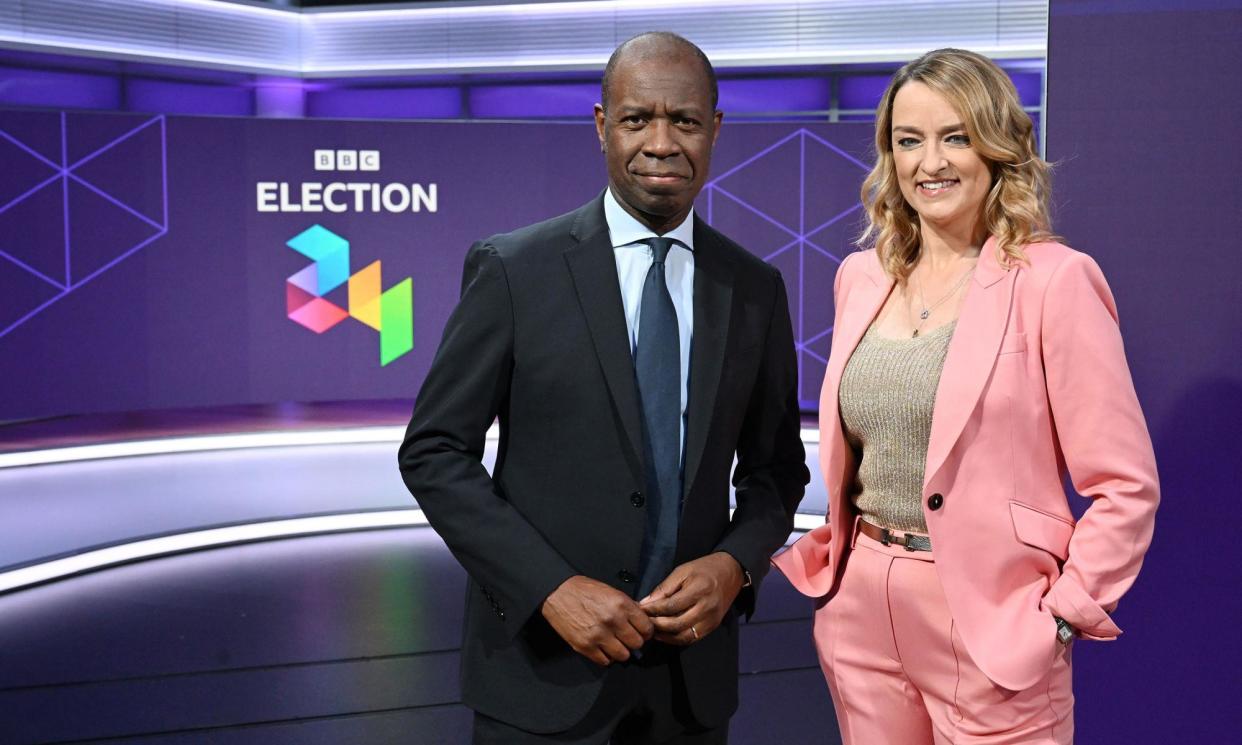Election TV review: Clive Myrie’s chicken grilling kicks off chaotic four-channel extravaganza

Standing under a buckling umbrella in the dark, cacophonous Manchester rain at a few minutes past 10 on election night, Angela Rayner braced herself to field a question from the BBC’s Clive Myrie. “You say you’re not counting your chickens,” Myrie gravely intoned. “What kind of chickens might they be? What kind of chickens would you like to see?” Welcome to the chaotic magic of the live, four-channel extravaganza that is TV on general election night.
The place to be for the opening exit poll reveal was Sky News. At 10pm precisely, in whizzed the graphic reading “Labour 410” – a number so significant, it caused host Kay Burley to peak early. “Oh! Oh! Oh! Oh-ho-ho!” she gasped, as Sky subscribers scrambled to turn the volume down, lest the neighbours gossip. But better that than the confused gawping on Channel 4, which had to cover for its lack of advance access to the exit poll. The presenters Emily Maitlis and Krishnan Guru-Murthy desperately filled while they waited for someone in the gallery to get Sky on, copy the numbers down and shout them into their earpieces.
The pundit lineups reflected the rapid podcastification of TV, with two channels simply buying in the hosts of a popular politics chatfest. Perhaps, however, the podcasters chosen formed a comment on the election itself. ITV had George Osborne and Ed Balls, while Channel 4 featured Rory Stewart and Alastair Campbell – both pairs being co-hosts who nominally disagree on everything while not really differing on anything fundamental. Stilted chat with no meaty answers was the result.
Faced with a historic swing to Labour that at the same time was more or less exactly what polling had predicted, everyone except Burley sounded unsure of how excited to be. So they fell back on another revealing indicator of the poor state of British political discourse: the twee interest in which constituency declares its result first. The BBC peppered its offering with flippant updates from the frontrunners, Blyth and Sunderland – for a while, the defining image of the night was a young volunteer sprinting through a corridor with a bin full of paper.
While we waited to find out who had won the big race – Sunderland were about to pull off a shock! – the main point of difference for broadcasters was their use of visualisations to brighten up the boring old regular results. Here the Beeb was, as usual, dominant, with a giant curved digital mural of blue rectangles turning red, staffed by an extravagantly flapping Jeremy Vine. ITV could only muster a screen the size of a weather map, while Sky’s Ed Conway struggled to sell a series of plain and yet, for the half-cut 1am crowd, confusing bar charts. The BBC won the battle for the red wall, but Sky’s boffins did pull off the presentational story of the evening, in the form of their holographic Keir Starmer.
The lifesized 3D future PM first appeared early on in the coverage. While Rayner battled with a video link that had such a long lag she was in danger of pulling the old Starmer trick of answering the question before last, suddenly the man himself seemed to be in the Sky studio, standing silent and reproachful in the middle of the floor. The presenters didn’t acknowledge Robo-Starmer’s presence and he/it didn’t rematerialise for another hour – had we imagined it? No, later on, there it was again, this time turning its head to maintain its lifeless eye contact with viewers as the camera panned away. Sky wasn’t the only channel to feature a ghostly, eldritch vision – Peter Mandelson was on the BBC panel for several hours – but AI Keir was the most haunting.
Once the big results flowed in, it didn’t much matter which channel you picked, but before that there were two clear victors. Channel 4 pepped up when Hugh Fearnley-Whittingstall and Carol Vorderman rocked up at some point past midnight and started being rude to everyone. Sky’s gang, with Andy Burnham and Ruth Davidson as genuinely polarised pundits, constantly shouted over each other and often forgot they had left an interviewee hanging on the giant screen behind them, because they were having too much chatty fun. Embracing the madness was the winning tactic.

 Yahoo News
Yahoo News 
